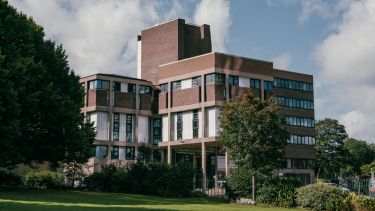Explore this course:
Apply now for 2025 entry or register your interest to hear about postgraduate study and events at the University of Sheffield.
Geographical Information Systems (GIS)
School of Geography and Planning,
Faculty of Social Sciences

Course description
This course is designed to provide you with a comprehensive understanding of the fundamental concepts, tools, and techniques used in Geographical Information Systems (GIS) with a focus on their application in real world contexts.
GIS skills are applicable across a wide range of industries including urban planning, environmental management, natural resource exploration, transportation, public health, disaster management, marketing, and many others. By studying GIS, you will gain a skill set that can be valuable in a wide range of career paths.
Throughout the course, you will be introduced to the core principles of GIS and its application in various industries; and gain hands-on experience with popular GIS software, including both ArcGIS and QGIS. You will also develop practical skills in data management, spatial and quantitative analysis, and visualisation.
The course combines computer-based workshops, lectures and project work to provide a solid foundation in GIS. By the end of the course, you will be equipped with the knowledge and tools necessary to work with spatial data in a wide range of fields, able to apply a variety of advanced spatial and quantitative analyses, and have the skills to create compelling maps and visualisations.
Facilities and equipment
Our postgraduate study rooms are equipped with the latest industry-standard GIS software and a range of other specialist tools. GIS facilities are available on all 1,500 networked computers across campus.
Modules
The first semester focuses on core skills and knowledge acquisition, whereas in the second semester you'll develop more advanced skills.
You'll put your knowledge and skills into practice when you write a dissertation on a relevant topic that matters to you.
Please note the Professional Skills Development module runs throughout the full academic year.
Core modules:
- Quantitative Analysis
-
This module introduces students to powerful and commonly used statistical methods in the social sciences. It assumes no prior statistical knowledge and focuses on the practical research priorities of selecting, conducting and interpreting the most appropriate test with an eye to, rather than an obsession with, the underpinning statistical foundations. The module uses weekly seminar sessions and SPSS practicals to build practical software skills alongside conceptual understanding.
15 credits - GIScience: principles and applications
-
Geospatial approaches, including those commonly associated with Geographical Information Systems (GIS) and spatial data analysis, are employed extensively in a variety of professional settings, from urban planning and architecture to health care and social research. In this module, we aim to consider the wider implications of GIScience in the context of applied GIS and urban analytics. This module is therefore focused on helping understand the core principles of GIScience as well as potential applications of GIS in helping identify and tackle spatial problems and undertake geospatial research in the real world. In particular, we encourage critical thinking about the applications of GIS and GIScience to spatial problems as well as exploring their limitations. The module is taught through a combination of lectures, seminars and case-studies.
15 credits - Foundations of GIS
-
This module introduces students to the core principles and skills of GIS. It covers the major sources of data used to study the lived environment and the variety of ways it can be displayed to aid both understanding and analysis. The module has a particular focus on techniques used in the analysis of socio-economic and demographic data and its potential applications. It is taught through a combination of lectures and practical workshops using ArcGIS software.
15 credits - GIS and Geovisualisation
-
The availability of software, hardware and data for geographical information systems (GIS) has increased rapidly in recent years. Alongside this, there have been exciting developments in cartography and visualisation methods. This module is focused on developing analysis and visualisation skills using a range of software but with particular focus on QGIS, the leading open-source desktop GIS. Students will learn through a combination of computer workshops and lectures and be exposed to the latest developments in the field. Assessment is by means of a spatial data visualisation and analysis project.
15 credits - Employability and Professional Skills
-
This module aims to provide a range of supporting skills for home and international students, which will help you get the most out of your learning in Sheffield, and to prepare you for professional employment and career development at the end of your studies. The module has two elements: 1. Cultures of Learning and Professional Skills - understanding how we teach at Sheffield, how to get the most out of your study and how to develop key generic professional/soft skills 2. Employability Skills - preparing you for careers within planning, design, real estate, GIS and related professional areas.
Core modules:
- Advanced Spatial Analysis
-
This unit is aimed at students who already have a good degree of knowledge in GIS. The module aims to develop in students a high degree of competence in relation to advanced spatial analysis, understanding spatial approaches to problem solving, and the theories and precepts which underlie software applications in GIS. The module is taught in a series of inter-related computer workshops focusing on real-world data and problem scenarios. The assessment for this module is based on a multiple choice exam and a 2,000 word advanced methods report.
15 credits - The GIS Project
-
This is a project-based module in which students address a real-world problem for a client using a variety of different spatial datasets and GIS methods as appropriate. The aim of the module is to prepare students for professional practice in GIS and through a group-work approach which places emphasis on collaboration, team working and objective-setting. This module is taught through a short series of lectures and group seminars. The module is assessed through a combination of a group presentation, a group final report and an individual reflection.
15 credits
Optional modules: students will take two optional modules from this group:
- Environment, Society and Development: Key Issues, Debates and Concepts
-
This module engages critically with the key theoretical debates that shape the relationships between the environment, society and international development. By looking at current questions in development theory and their relationship to development practice in the context of the Anthropocene and environmental change, it encourages students to think critically about the ways in which interdisciplinary approaches define issues and problems, and the theoretical viewpoints that inform their actions. The module is taught primarily through seminars: these structure students' learning, and provide an environment in which they can develop their skills in researching, presenting and debating arguments drawn from the academic literature on international development.
15 credits - Managing Climate Change
-
This module aims to provide students with a strong understanding of the social and physical science of climate change with relevance to international development. This understanding is then applied to consider the challenge of living with climate change in the Global South. The module is taught through seminars and lectures. Lectures introduce and impart factual knowledge while seminars allow discussion and an emphasis on applying key concepts to practical situations. Together these structure students' learning, and provide an environment in which they can develop their skills in researching, presenting and debating arguments drawn from the wide ranging literature on climate change.
15 credits - Spatial Data Science for Social Sciences
-
This module is designed to provide an introduction to the concepts and methods of 'data science' and, in particular, how they can be utilised in conjunction with spatial data. The module will particularly focus on applications within social sciences and demonstrate how these skills can be applied in urban contexts . The module will introduce students to how programming approaches can be used to tackle problems in data handling, data analysis, and data visualisation. This will be of particular interest to those who wish to develop their technical and analytical skills in a real-world, problem-oriented context and will add in-demand employability skills. It will also appeal to students who wish to understand 'data science' as an approach to investigating the world around us. No prior programming experience is required but students will be expected to have some familiarity with core concepts of coding (e.g variables, operators, assignment, loops and functions) through prior reading.
15 credits
- PropTech and Real Estate Innovations (PGT)
-
This module introduces innovations in real estate with an emphasis on PropTech tools and platforms. It provides students with an understanding of the evolution of real estate digital systems and platforms through computing, internet, cloud, IoT, blockchain, virtual reality, AI, drones etc. The module will develop students' foundational knowledge and understanding of the theory and application of data science and analytics and how these can be applied to a variety of real estate operations and practice areas. The module will also enable students to appreciate and develop other soft skills such as creativity, communication, strategic thinking, ethics, entrepreneurship, and problem solving which have underpinned PropTech and other contemporary real estate innovations. The module will be delivered through a combination of problem-oriented, collaborative and project-based learning approaches and students will be encouraged to critically analyse existing real estate operations and practice enablers. The ultimate aim of the module is to enable students to develop innovative systems to further enhance the economic, physical, environmental and social efficiency of real estate operations and practice. Students will gain perspectives on different digital tools in commercial, residential and operational real estate and across the core real estate practice areas and sectors such as land management, development, construction, finance, investment, valuation, portfolio management, asset and property management, agency and brokerage. Students will also gain insight on other real estate innovative systems such as flexible, shared and third spaces, and the role of technology as enablers of these advancements.
15 credits - Citizen Participation in Planning and Development
-
Recent decades have seen a proliferation of initiatives to involve citizens in policy-making, planning and urban governance. There is widespread agreement that 'citizen engagement' can play a positive role in democratizing urban development. However, public participation raises a range of significant challenges for urban professional practice. This module will draw on critical debates about the roles citizens and publics can and should play in shaping the city to reflect on the theory and practice of participation. The module is taught through seminars which structure learning, and help students to research case studies of participatory initiatives.
15 credits - The Urban Climate Emergency (PGT)
-
Climate change is one of the most significant and urgent challenges of the 21st century. Cities generate over 70% of the world's CO2 and consume 60% of global energy, they will therefore play an important part in mitigating the extent of climate change and in adapting to the effects of the climate crisis and its impacts on societies and the global environment. This unit will explore the drivers of climate change and their implications for urban systems, critically considering how urban professionals can respond to these challenges in ways that promote just and sustainable transitions.
15 credits - Issues in Housing
-
The aims of the module are twofold: to build both on substantive knowledge, theory and skills about housing gained in earlier parts of both the UG and PG courses, with an emphasis on policy analysis; and to look more closely at the links between housing and planning (in its widest sense) at the local and regional level.
15 credits - Urban Informality
-
The overall aim of this module is to critically examine informality, with a particular but not exclusive focus on cities of the Global South. The module relies on a mixture of lectures, seminars and student-led group work, with the latter focusing on an in-depth case study of a selected city. It explores patterns and causes of informality and discusses the strengths and limitations of a range of theoretical approaches. It also analyses the success of different real-world urban planning responses (understood in broad terms), including government-led, donor-led and community-focused ones, in addressing key urban issues in the context of informality.
15 credits - Planning Law
-
The course is intended to develop students' expertise in the legal framework for the planning system and to set that legal framework within the wider context of law in the United Kingdom. It considers the origins of planning law and seeks to provide explanations for the powers that the law confers on decision makers. The course focuses particularly on the development control aspects of planning law and looks at the rights and duties of applicants, local authorities and the Secretary of State in making and determining planning applications. It considers the criteria for decision making and the possibilities for the redress of grievance. It considers planning law in the light of wider discussions about human rights and planning gain.
15 credits - Health, Wellbeing and the City
-
This module explores the urban environment as a determinant of health and well-being and examines how planning and urban design can contribute to improvements in health. Beginning with an exploration of the historic relationship between planning and public health, the module focuses on how the urban environments support or undermine health in relation to mental health, ageing, obesity, air quality and noise pollution. The module also introduces the notion of health impact assessment and further reflects on the contribution of planning to environmental justice and the reduction of inequalities in health.
15 credits - Urban Heritage and Conservation
-
This module aims to introduce the theories and practices of urban heritage conservation in a global context, and equip students with the basic skills to appraise heritage value and propose a planning response for conservation. This is achieved by discussing the evolution of the heritage movement and the shifting of conservation focus in the urban built environment. Critical questions will be debated in class such as how heritage is defined, by who, as well as the implications of conservation practices at different scales. We will look at the contemporary challenges to heritage conservation and the role of heritage in future place-making and sustainability. Using case studies, we will examine the creative conservation practices in the UK and internationally. Students will develop their own heritage project to critically apply the knowledge and skills to a real world case.
15 credits
Core modules:
- Geospatial Dissertation
-
This module is a major research project that offers the opportunity for students to develop and manage an individual and [theoretically informed] empirical research project. In the course of this module, students will gain experience in the key stages of undertaking a research project, these include some or all of: identifying a topic; conducting a review of the literature; identifying research questions; selecting methods; designing and conducting a project of research; and presenting the outcome of the project in a logical and coherent written format. They will also develop an appreciation of the issues involved in managing a GIS research project, including experience in sourcing, handling, and processing spatial data in a research context, and will further deepen their knowledge and experience of GIS and spatial analysis skills in a chosen field of study.
60 credits
The content of our courses is reviewed annually to make sure it's up-to-date and relevant. Individual modules are occasionally updated or withdrawn. This is in response to discoveries through our world-leading research; funding changes; professional accreditation requirements; student or employer feedback; outcomes of reviews; and variations in staff or student numbers. In the event of any change we'll consult and inform students in good time and take reasonable steps to minimise disruption.
Open days
An open day gives you the best opportunity to hear first-hand from our current students and staff about our courses.
Open days and campus tours
Duration
1 year full-time
Teaching
As a technical field, most teaching is through computer-based workshops, supplemented by lectures, seminars and tutorials.
The course has a strong applied emphasis and draws upon the extensive expertise of teaching staff in the department. This means that in addition to developing strong analytical and technical skills using GIS software, you'll be immersed in the practical applications of GIS software and its potential to solve real world problems.
Assessment
You’re assessed on your coursework and a dissertation.
Your career
Graduates go on to work for a diverse range of organisations such as the Ordnance Survey, ESRI, the civil service and local government. We also have many students go on to graduate schemes with engineering and planning firms like Jacobs, Arup and Mott Macdonald.
The employability of our graduates is of paramount importance to us. The development of skills, knowledge and personal attributes that enhance your career underpins our course design. We'll prepare you for employment after graduation and have a dedicated Employability Manager to support you.
Facilities and equipment
Our postgraduate study rooms are equipped with the latest industry-standard GIS software and a range of other specialist tools. GIS facilities are available on all 1,500 networked computers across campus.
The department is based in the Geography and Planning Building on the edge of Weston Park.
School
School of Geography and Planning
We have an intellectual reputation for theoretical strength, especially in the fields of urban inequalities and social justice. Study with us and become part of a new and exciting group of urban professionals and change makers.
As a student at Sheffield, you'll develop the knowledge and skills to build a successful career in planning and related urban and environmental professions. You'll be taught by world-leading academics whose cutting-edge research feeds directly into the seminar room. You'll learn using the latest technology in our dedicated teaching spaces; visualising complex data through Geographical Information Systems (GIS) software and using virtual and augmented reality to explore how people interact with urban spaces.
You'll be at the heart of a vibrant academic community and will benefit from an excellent staff-student ratio, resulting in a genuinely friendly and inclusive academic environment. Our open-door policy means you can drop in on your lecturers at any time during their office hours, without an appointment. We believe this will help with your wellbeing and encourage your intellectual curiosity.
We work with national governments, international bodies such as the UN, research councils, private business, the voluntary sector, and local communities to shape policy and inspire change in urban environments. Join us to explore the pathways to creating fair, just and sustainable places.
Entry requirements
Minimum 2:1 undergraduate honours degree in any subject.
English language requirements
IELTS 6.5 (with 6 in each component) or University equivalent
If you have any questions about entry requirements, please contact the school/department.
Fees and funding
Apply
You can apply now using our Postgraduate Online Application Form. It's a quick and easy process.
Contact
usp@sheffield.ac.uk
+44 114 222 6900
Any supervisors and research areas listed are indicative and may change before the start of the course.
Recognition of professional qualifications: from 1 January 2021, in order to have any UK professional qualifications recognised for work in an EU country across a number of regulated and other professions you need to apply to the host country for recognition. Read information from the UK government and the EU Regulated Professions Database.



